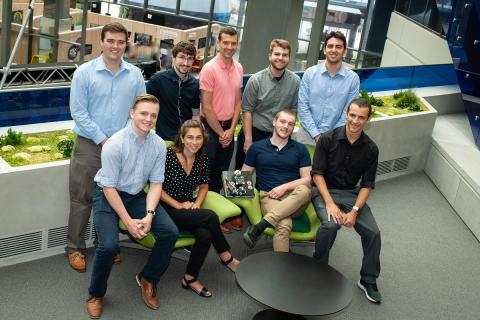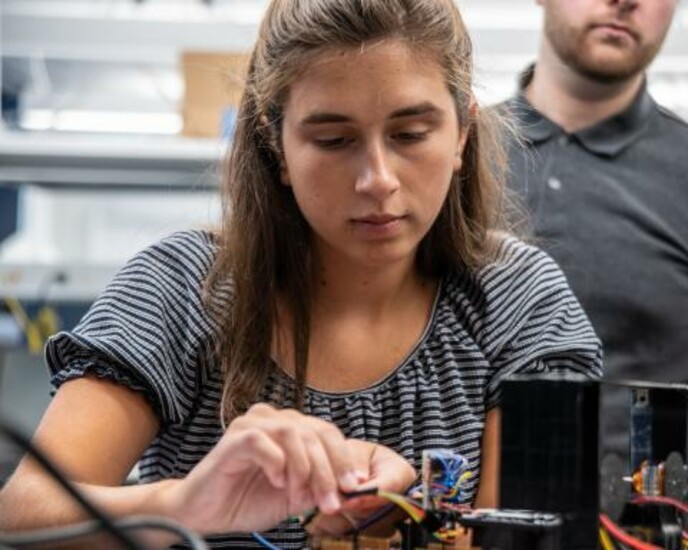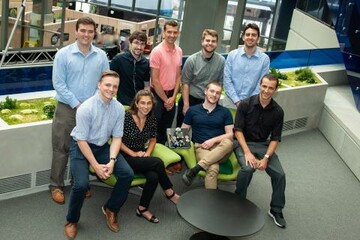Students, with Self-guided Hovercrafts, Compete to Win in Draper’s Summer Internship Program
CAMBRIDGE, MA—A self-guided hovercraft built by student interns in Draper’s Hardware Division cruised the wide expanse of Draper’s Atrium and earned top place when it homed in and hit its target. The event was part of this year’s summer internship program: an engineering competition between 14 students from nine U.S. universities split into two teams of seven.
Draper instructed the teams to design and build a hovercraft that could autonomously navigate a course, visually acquire a target with a small camera at the front of the craft and impact the target as quickly as possible, all while meeting challenging size, weight and power consumption requirements for the vehicle. The students needed to incorporate electrical and mechanical engineering concepts such as vision-based and inertial navigation, design architecture, propulsion, fluid mechanics, thermal analysis, embedded software, systems engineering and hardware integration.
The project was coordinated by Draper engineers Eric Holtzman, Mike Iannucci, Will McFarland and Dan Rossetti. Rossetti, a mechanical engineer by training, credits the students with designing, building and integrating a hovercraft using the same engineering and project management skills they will use in their professional careers. “Our interns are responsible for the engineering design process from start-to-finish, and are expected to adjust to and overcome the same challenges that any engineer in industry might face,” Rossetti said.
Just like in real life, the technical requirements changed mid-course. Initially, the project entailed designing an autonomous wheeled vehicle, but the advisors modified this and instead required the students to design an airflow system to lift and guide a hovercraft. The advisors later added an additional challenge by asking the students to employ model-based engineering and trade space analysis to optimize their vehicles. These concepts are common in engineering companies but rare in student internship programs.
A theme running through the students’ experience was that it gave them exposure to project management at a large and complex engineering firm. Maria Martucci, an electrical and computer engineering student at Cornell University who was responsible for her team’s electronics fabrication and analog circuit design, said, “What stands out is that this was an independent student project. We scheduled the meetings, made budget decisions, delegated tasks and balanced our time between the intern competition and our work on customer programs.”
Jeremy Spear, a chemical engineering student at Cooper Union for the Advancement of Science and Art, agreed. Spear, who served as a mechanical engineer and purchaser for his team, said, “The biggest takeaway was being involved in a truly challenging engineering project from start to finish. Most three-month internships only let students experience an intermediate snapshot of a project, and often you don’t know what the project is about or how it’s evolved. But being a part of a project from ideation to completion was a fun and unique experience.”
Alexander Mochrie, a computer engineering student at the University of Florida, served as his team’s electronics and software leader. He said future interns should expect to be thoroughly challenged, but they should embrace the experience. “A good challenge is one that requires you to creatively and inventively use the skills and resources at your disposal. At times during my internship, some obstacles felt insurmountable, but that just made it so the payoff for overcoming them was so much more empowering.”
Draper’s interns competed in two teams. Team Ductboat included Jared Breton, a mechanical engineering student at the University of Maine Orono; Aisling McEleney, who is studying biomedical engineering at the University of Massachusetts Lowell; Jacob T. (JT) McGuire, an electrical engineering and computer science student at the Massachusetts Institute of Technology; Kevin Shoyer, who is studying engineering at Harvey Mudd College; Spear; Linden Vo, an electrical engineering student at Boston University; and Kasandra Yee, who is studying electrical engineering at Northeastern University.
Team Hades included Martucci; Mochrie; Gene Munnis, a mechanical engineering student at the University of Massachusetts Amherst; Jeremy Nashed, who is studying mechanical engineering at the Georgia Institute of Technology; Elias Prince, a mechanical engineering student at the University of Maryland; Matt Sanford, a mechanical engineering student at Worcester Polytechnic Institute; and Quinn Schebell, who is studying electrical engineering and computer science at the University of Michigan.
In recent years, Draper’s summer interns have designed and built a payload-carrying blimp, a wall-climbing robot and a human-powered flying machine in the form of a dragon inspired by Game of Thrones.
Released August 26, 2019










